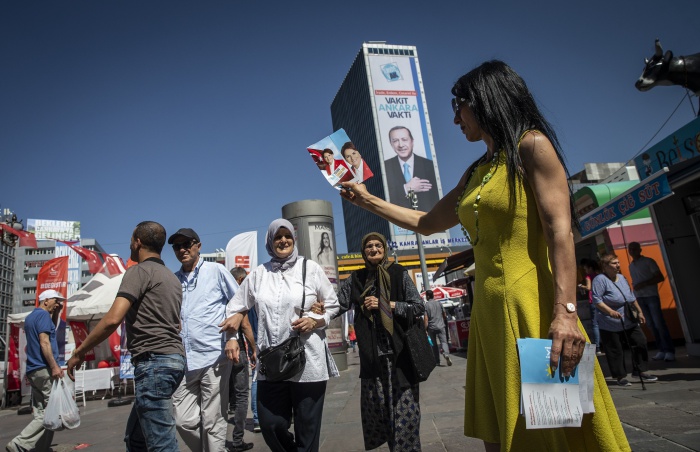As of Thursday, because only 10 days remain until parliamentary and presidential elections in Turkey, there will be a blackout on publishing the results of opinion polls, as stipulated by the election law.
Starting from the time that President Recep Tayyip Erdoğan announced snap elections would be held on June 24, polling companies went into full gear to produce the most accurate surveys of public opinion.
They only deepen the uncertainty of the election outcome, though.
Erdoğan and his ruling Justice and Development Party (AKP) have been winning elections since 2002; however, this time the rules are a bit different thanks to a referendum last year that introduced an executive presidential system of governance in the country.
The voters will cast one ballot for a presidential nominee and one for a political party or an independent candidate to become a member of parliament. There are 74 independent candidates from 32 provinces.
The number of parliamentary members has been raised from 550 to 600, while a new election law allows political parties to form alliances more easily than before, after which two big alliances emerged.
The race for a parliamentary majority will be held between the Public Alliance (Cumhur İttifakı), which consists of the AKP, the Nationalist Movement Party (MHP) and the Grand Unity Party (BBP), and the Nation Alliance (Millet İttifakı), comprising the Republican People’s Party (CHP), the İYİ (Good) Party, the Felicity Party (SP) and the Democrat Party (DP).
According to the latest surveys, neither alliance will garner over 50 percent of the vote, in which situation the Peoples’ Democratic Party (HDP) will become a critical player if the party can surpass the election threshold of 10 percent.
While the majority of pre-election surveys indicated the HDP will pass the 10 percent threshold, HDP deputies in particular are signaling that it’s a thin-razor margin in order to boost public support.
For the presidential post, there are six candidates: President Erdoğan, the CHP’s Muharrem İnce, the İYİ Party’s Meral Akşener, the HDP’s Selahattin Demirtaş, the SP’s Temel Karamollaoğlu and the Homeland Party’s (VP) Doğu Perinçek.
Since the Public Alliance agreed on Erdoğan’s candidacy and has been campaigning for him, the Nation Alliance chose to nominate a candidate for each party for ratcheting the participation of their grass roots up in the election.
If no candidate wins more than 50 percent in the first round of voting on June 24, there will be another round to determine a victor.
For this second round, Erdoğan and İnce will probably be the rivals, as surveys suggest.
However, there were also polls indicating a clear win for President Erdoğan in the first round. Some of them also suggested that Erdoğan’s charm was more influential than his party and that therefore his share of the vote in the presidential election would exceed the AKP’s share in the parliamentary races.
In May, surveys were giving more of a chance to Akşener, attracting more than 20 percent of public support; however, following İnce’s successful election campaign performance, new polls have revealed Akşener would have support of only around 10 percent.
On May 16, KONDA, a leading poll company in Turkey, revealed that if in the first round İnce were to win 30 percent of the vote, or if President Erdoğan were to get less than 45 percent, İnce could win in the second round.
Pollsters have also suggested that MHP supporters were not completely convinced about Erdoğan’s sole candidacy, which could indicate a change of heart for MHP voters in their presidential choice.
Still, most of the surveys have shown so far that the AKP can garner some 40 percent support in any case and that the MHP’s performance will be decisive for the fate of the alliance.
Since their alliance in last year’s referendum secured only a narrow win by 52 percent, the opposition expects them to stay under 50 percent this time.
However, a Bloomberg survey announced yesterday caused dismay in the social media accounts of Turkish dissidents, forecasting a 50.8 percent win for President Erdoğan. Vocal critics, including Turkish economist and Ford Foundation Professor of International Political Economy at Harvard University Dani Rodrik, harshly criticized Bloomberg’s methodology in conducting the survey.

